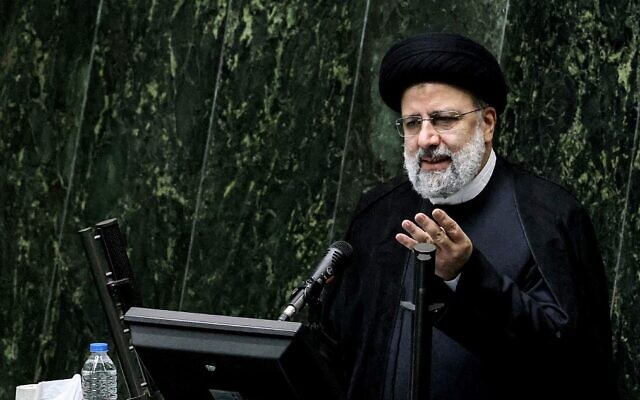Photo: Atta Kenare/AFP
UPDATE, AUG 26:
As expected, Parliament has approved almost all of the Cabinet nominees of President Ebrahim Raisi.
On Wednesday, 18 of 19 Ministers were confirmed. Only Hossein Baghgol, nominated for Education, was rejected on the ground that he did not have the necessary qualifications.
Foreign Minister Hossein Amir Abdollahian was supported 270-10, with six abstentions.
Defense Minister Mohammadreza Ashtiani received 274 votes, Economy and Finance Minister Ehsan Khandouzi 254, and Interior Minister Ahmad Vahidi 266.
Raisi later told the new Cabinet that the current situation was “not great” and “must change”: “In some areas, we have serious backwardness that must be compensated by work and efforts around the clock.”
ORIGINAL ENTRY, AUG 22: Iran President Ebrahim Raisi has presented his Cabinet to Parliament for approval, declaring the escalating Coronavirus pandemic and economic crisis as his foremost areas of concern.
Raisi told the Majlis on Saturday, “The government’s first priority is controlling the coronavirus, improving the health situation and widespread vaccination….“The economy and the livelihood situation is the second.”
See also How Much Will Iran Risk Over the Persian Gulf and Israel?
Iran is in the midst of a fifth wave of Coronavirus setting records for daily deaths and cases. On Sunday, the Health Ministry reported a daily record of 684 victims and 36,419 infections.
Iran’s official total for the pandemic is more than 102,000 deaths and almost 4.7 million cases.
Raisi has given few specifics about Coronavirus measures, including over the low rate of only 5.3% fully-vaccinated Iranians. However, authorities instituted a six-day lockdown from last Monday in the capital Tehran and other cities.
See also Coronavirus: Iran’s Death Toll Passes 100,000
Coronavirus — Iran’s In-Fighting Over Deadly Vaccine Ban
Raisi said his nominated Health Minister, optometrist Bahram Eynollahi, is “a figure who can rally forces in the fight against Coronavirus”.
But Eynollahi was among the signatories of a January open letter backing the Supreme Leader’s ban on vaccines made in the US, UK, and France, declaring they may cause “unknown and irreversible complications”.
The measure restricted Iran’s vaccination drive, launched in early February. Ayatollah Khamenei quietly stepped back and lifted the ban earlier this month.
The new Government is also facing the combination of long-term economic problems and US sanctions, as it holds off resumption of the Vienna talks to renew the 2015 nuclear agreement with the 5+1 Powers (US, UK, France, Germany, China, and Russia).
Inflation is above 50%, the historically-weak currency is declining again, unemployment is rising, and there have been periodic protests across the country, including over water shortages and blackouts.
Raisi acknowledged the difficulties:
You are well aware of the situation. Solving the problems of inflation above 44% declared by the Statistical Center or more than 55% of the Central Bank, a sharp devaluation of the national currency, a significant budget deficit, severe power shortages and hardships, high liquidity growth, high government debt and other issues is possible, but it requires a plan. It also needs an efficient force that can be transformative in any part of the country.
But he gave few specifics in his address, preferring platitudes such as “We know that the time for service is short and the pains and problems of the people are numerous.” He invoked the Supreme Leader’s nine-year declaration of a “Resistance Economy” and said he would promote the “excellence of the Islamic and Iranian culture”.
All of Raisi’s nominees — hardliners, conservatives, and Revolutionary Guards commanders — are expected to be approved by a Parliament with a large hardline-conservative majority.


“As expected, Parliament has approved almost all of the Cabinet nominees of President Ebrahim Raisi.”
Better describe as the clown show.
At 3.57 rostam ghasemi gives accpetance speech in the parliament as if he is the oil minister, except, he is urban development minster. He always wanted to be the oil minister though, does that count? And the oil minister himself is in the room.
https://www.youtube.com/watch?v=RaX62mr1FHM
And then at 4:29 ahmad vahedi labour minister gives acceptance speech as if he is the treasury ministry, again that person is in the room.
You could make years worth of monty python series with this stuff…